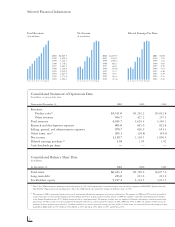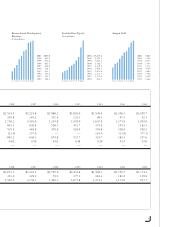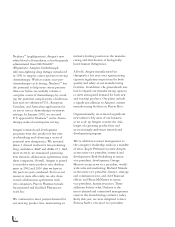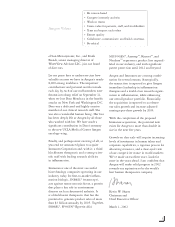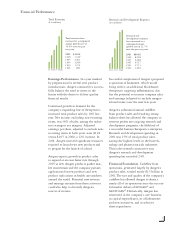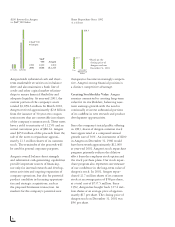Amgen 2001 Annual Report Download - page 12
Download and view the complete annual report
Please find page 12 of the 2001 Amgen annual report below. You can navigate through the pages in the report by either clicking on the pages listed below, or by using the keyword search tool below to find specific information within the annual report.
Anemia can result from cancer-related
chemotherapy, as well as the underlying
cancer itself. It can also accompany many
other serious conditions, such as rheuma-
toid arthritis and HIV/AIDS. Indeed,
anemia can be present in any patient who
suffers substantial blood loss as a result
of surgical treatment.
The appearance of anemia across such
a wide spectrum of medical conditions
and treatment settings underscores
the broad potential of Amgen’s newest
anemia treatment, Aranesp
™
(darbepoetin
alfa). A more powerful, longer-lasting
therapeutic than Epoetin alfa, Aranesp
™
can simplify anemia management for
patients and health care providers alike
with the benefit of less-frequent dosing.
Aranesp
™
was approved last year in
the United States, Europe, Australia, and
New Zealand for the treatment of anemia
associated with chronic renal failure,
Amgen’s first area of focus for the new
therapeutic. For chronic renal failure
patients, both on dialysis and not on dial-
ysis, the new molecule retains the efficacy
of EPOGEN
®
(Epoetin alfa) while adding
the benefit of less-frequent dosing. For
health care staff, this may mean less time
spent managing anemia.
With the availability of the new
therapeutic, doctors may begin using
Aranesp
™
for the treatment of anemia
earlier in the progression of renal failure.
Although only a small proportion of
patients today are treated for anemia prior
to the onset of dialysis, as many as one-
third may suffer from the condition. And
there is a growing body of evidence to
suggest that early treatment is beneficial.
Amgen also is pursuing regulatory
approval in the United States, Europe,
Canada, Australia, and New Zealand
for Aranesp
™
in the treatment of cancer-
related anemia. As many as 60% of cancer
patients suffer from anemia, either
because of the cancer itself, or as a side
effect of chemotherapy. Clinical trials
suggest that treatment of cancer-related
anemia with Aranesp
™
may be effective
when given once weekly, once every two
weeks, or once every three weeks. In over
two-thirds of cases, cancer chemotherapy
is given in similar one-, two- and three-
week cycles.
Amgen developed the first biologically
derived treatment for anemia more than
13 years ago. EPOGEN
®
revolutionized
the care of end-stage renal disease patients
with anemia, who must undergo regular
dialysis treatments to remove wastes from
their blood. EPOGEN
®
is a recombinant
protein with the same mechanism of
Amgen won an important
legal victory in early 2001
upholding the company’s
intellectual property rights for
its breakthrough therapeutic
in the treatment of anemia.
10




